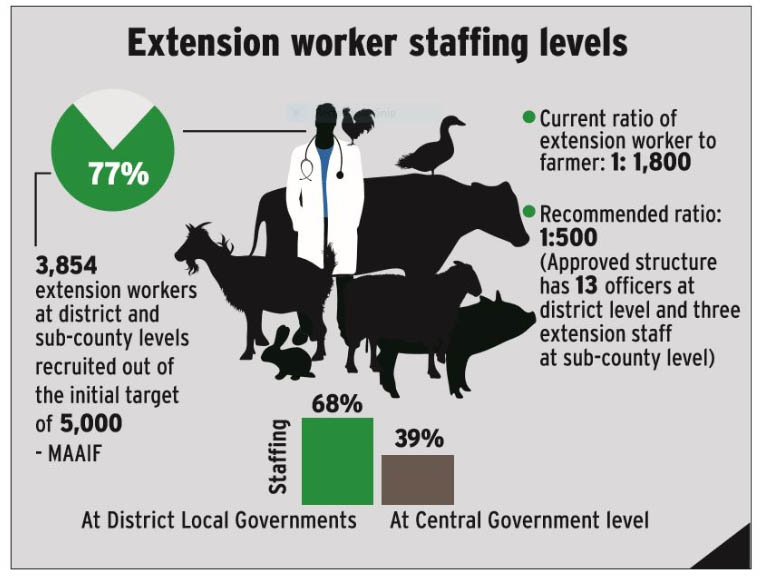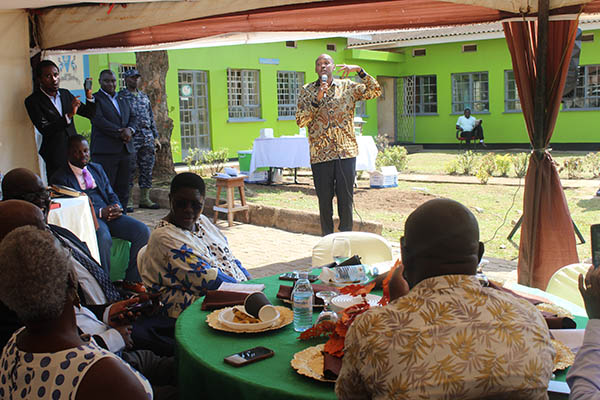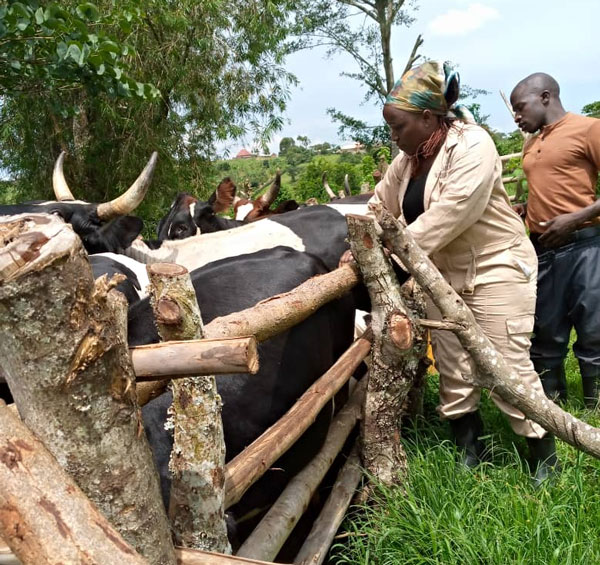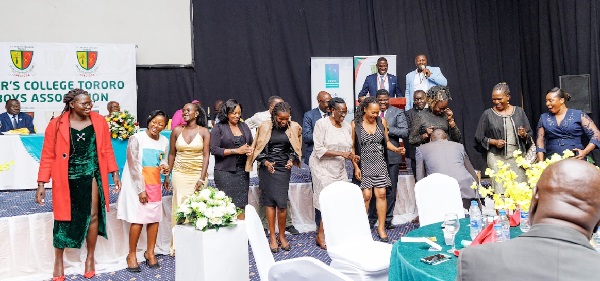 |
| Situation in 2020. GRAPHIC NEW VISION |
THE role of Uganda’s agricultural extension system was questioned recently when a leading official at the Ministry of Agriculture, Animal Industry and Fisheries (MAAIF) told a workshop in Kampala, that "Agriculture production in Uganda has increased since 1962, but productivity has not improved."
Soon after, the new Uganda Veterinary Association (UVA) President Dr Andrew Akashaba reiterated the role of the extension workers. At the inauguration of the new UVA executive last week, Dr Akashaba called for vacant Veterinary Officer positions in districts to be filled, and urged the Minister of Agriculture, Animal Industry and Fisheries Frank Tumwebaze, to support efforts to reach farmers.
"The animal industry currently contributes about 4% of the GDP. Behind this performance, there is a professional or foot soldier known as 'a veterinarian' or 'a veterinary paraprofessional' in government service or in private practice. If the strengths of these foot soldiers can be harnessed, we promise you honorable Tumwebaze that our animal industry can grow to a level where you desire it," Dr Akashaba said in his acceptance speech after swearing in.
He explained that due to the decentralization policy, some political leaders in local governments have chosen to sacrifice veterinary positions.
"Some leaders tend to think that the services of a vet are only needed in the cattle corridors. This makes the presence of our foot soldiers very thin on the ground," Dr Akasaba said, adding that as a result, districts like Kitagwenda, Buhweju, Butebo, Gulu, Pakwach, Kibuku, Kalaki, Amuria and Manafwa do not have a substantive District Veterinary Officer. (CLICK > FULL SPEECH)
Akashaba's pleas have been answered immediately.
Minister of Agriculture, Animal Industry and Fisheries Frank Tumwebaze on Tuesday issued "Circular Number 2 to district leaders and officials on the strengthening of extension services at the district and sub county levels." Circular 2, follows Circular No.1 issued on November 19, 2024 regarding “utilization of agricultural mechanization".
Circular 2 delves extensively on the supervisory role that political leaders in districts can play to address the issue of extension services especially at Sub County level, that is the nearest centre for Government administration and service delivery to the farmer.
 |
| Tumwebaze speaking at the UVA executive inauguration in Kampala last week |
The circular covers all farming activities in the animals, fisheries and crop sub-sectors.
At the inauguration of the UVA executive in Wandegeya last week, Minister Tumwebaze said he was disheartened to hear citizens telling President Yoweri Museveni — who is currently on a countrywide tour to assess the Parish Development Model — that extension workers do not reach them.
"So, why do farmers still complain of lack of advisory and any farm visits from extension staff?"
Tumwebaze confirmed that on average, many districts have 15 sub counties or Town Councils. Also on average, each sub-county has at least two full-time extension workers (staff) responsible for crop and veterinary. Some sub-Counties have a third person for fisheries.
"So, why aren’t these 30 or more agriculture professionals in a district adequately carrying out farm visits, controlling diseases, inspecting agro-input dealers, collecting agricultural data and statistics and planning and inspecting agro- processing facilities in coffee, tea, maize, animal feed manufacturing and dairy?"
The minister therefore reiterated the importance of Districts and sub- county local governments in delivering agricultural services to the farmers.
"These represent the central government (MAAIF) at district and sub-county level under the Policy of decentralization. At the district, there is the department of agricultural production coordination staffed with professionals of agronomy, veterinary and fisheries
science. A commercial officer is also employed at the district level for agri-business and market promotion. The same professionals are employed at the sub-county level."
He said that government has prioritized and increased the salaries of agricultural scientists almost twofold to motivate them.
"For example, a sub- county extension worker (crop scientist, vet officer and fisheries officer) now earns sh4.25m per month up from about sh2m two years ago. Government intentionally targeted these key professionals at the sub-county level to motivate them such that they can work with no excuse of low pay," he explained.
Minister issues Circular No. 2
" I am writing, therefore, to guide and mobilize all of you fellow leaders at the district level to join hands with the central Government (MAAIF) and make sure that the now well-paid agricultural professionals do their work in a more serious and patriotic manner."
Tumwebaze said that beyond offices with technical mandates, each of the various stakeholders at the district — the Chief Administrative Officer, the District Security Committee and District Executive Committee and Council — have a role to play in one way or another.
He restated that all the technical offices in the extension system directly fall under the Chief Administrative Officer (CAO).
 |
| A veterinary doctor in the field checks on cows |
"The CAO, therefore, has a supervisory duty to ensure that they perform on their mandated tasks and where there are emerging policies, ensure they adapt and conform. The CAO’s role is very sensitive because he also has disciplinary powers over the extension staff. Government shall therefore, be holding CAOs responsible for negligence of their duty if their respective staff are not working."
The District Security Committee (DSC), Tumwebaze said in his circular, has a key role of ensuring that government policy on agriculture development is implemented successfully.
"If for instance, disease control measures are flouted by some sections of the public by allowing animal movement or trade amidst quarantine, the entire livestock industry could go down affecting not only household incomes but also the economy."
Tumwebaze added that the DSC must put in place particular measures to fight the rampant cattle and coffee thefts in many districts.
On District Executive Committee and Councils, he reminded members that, "an elected leader for example a Councilor is mandated to exercise oversight in a Sub County and report to the CAO or RDC where there are performance gaps. This is how collectively, all of us actors in the agricultural service delivery chain or structure shall play our roles."
He called on District Chairpersons and CAOs of districts with sub-counties that have unfilled vacancies of extension staff to submit immediately the gaps to Ministry of Local Government.
"You should also send us (MAAIF) data on the status of means of transport you have for the extension staff," he concluded.
The need for improved extension work is what Ministry of Agriculture, Animal Industry and Fisheries (MAAIF) official James Kakungulu seemed to have in mind when he made his remarks about the quality of Uganda's agriculture at a UCSAT workshop for media in Namanve last month.
As the $350million (sh1.2 trillion) Uganda Climate Smart Agricultural Transformation (UCSAT) project gets underway, Minister Tumwebaze in Circular 2 has ensured the role of the extension worker will be a key focus.
Agricultural extension services are key, he states, to sustained progression of smallholder farmers from subsistence agriculture to market oriented and commercial farming.
****
ADAPTED FROM THE INDEPENDENT
******
RELATED STORIES
QUACK DOCTORS https://www.independent.co.ug/uva-minister-tumwebaze-agree-to-end-menace-of-quack-veterinary-doctors/
SMART AGRICULTURE FOR UGANDA https://www.independent.co.ug/world-bank-to-help-uganda-make-maggot-soldier-fly-and-bee-farming-popular/
NO VET SHOULD BE POOR https://www.independent.co.ug/byabashaija-no-vet-doctor-should-be-poor/
AKASHABA THE MAN https://www.independent.co.ug/akashaba-leads-clean-sweep-of-uganda-veterinary-association-elections/








































